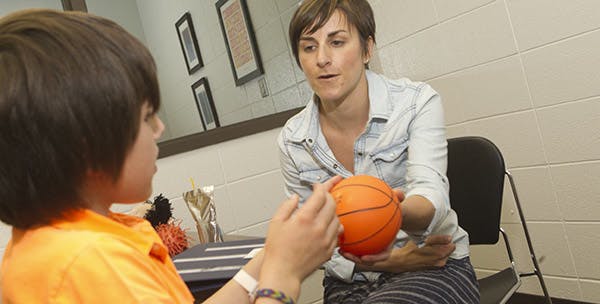
A College of Education-led resource for children with autism spectrum disorder now helps them with communication and behavior.
Working with his colleagues Scott Ardoin and Alicia Davis, Kevin Ayres, an associate professor in the College's Department of Communication Sciences and Special Education, launched the clinic last year following the successful start of a program to train educators in Board-Certified Behavioral Analysis, or BCBA. The project is funded by a $1.2 million U.S. Department of Education grant, "Analysis, Interpretation, Instruction, Management: Functional Assessment and Intervention for Individuals with Autism in School-Based Contexts."
With fewer than 150 certified BCBAs in Georgia, many of them in the Atlanta area, there was a need to train future educators in this specialization, Ayres says. The clinic, which makes use of facilities at the UGA Speech and Hearing Clinic, was a natural progression.
"There was a combination of three broad factors: a community with a need for this service, students with a need for this training and an opportunity for us to create something that would provide immediate benefit to those two constituencies while at the same time allowing us to conduct research on campus," says Ayres.
The clinic works with children and their families to teach them communication skills and how to manage outbursts in the classroom and at home. For students, the experience gives them a deeper understanding of the children and how to better manage a classroom.
"We assess the child in the first visit or two, and then implement a plan to help the child learn how to communicate," says Ayres. "We teach them how to appropriately communicate a request for something rather than engage in problem behavior to communicate that request."
At one session, a 5-year-old girl diagnosed with autism spectrum disorder sat at a table in the clinic while her parents watched from behind a one-way mirror. As the girl fidgets in her seat, the graduate students working with her ask her to match cards on the table. As she puts them together, she is rewarded with "free time" -- a few minutes to draw what she wants on oversized sheets of paper.
Typically, children attend two sessions a week after school or in the evenings. Local schools or community organizations that work with children with disabilities refer a limited number of cases to the clinic.
The program also offers students the ability to satisfy a board requirement of gaining at least 1,000 hours of field work before taking the BCBA examination. Students get experience in various locations including clinics, in-home therapy, after-school programs, classrooms and working with adults in vocational settings.